- Home
- Roy J. Snell
The Magic Curtain Page 12
The Magic Curtain Read online
Page 12
CHAPTER XII THE LOST CAMEO
In spite of the fact that the Opera House was dark on the followingnight, adventure came to Petite Jeanne, adventure and excitementa-plenty. It came like the sudden rush of an ocean's wave. One moment sheand Florence were strolling in a leisurely manner down the center ofState Street; the next they were surrounded, completely engulfed andcarried whither they knew not by a vast, restless, roaring, surging seaof humanity.
For many days they had read accounts of a great autumn festival that wasto occur on this night. Having never witnessed such a fete, save in hernative land, Petite Jeanne had been eager to attend. So here they were.And here, too, was an unbelievable multitude.
Petite Jeanne cast a startled look at her companion.
Florence, big capable Florence, smiled as she bent over to speak in thelittle French girl's ear.
"Get in front of me. I'll hold them back."
"But why all this?" Petite Jeanne tried to gesture, only to end byprodding a fat man in the stomach.
"This," laughed Florence, "is Harvest Jubilee Night. A city of threemillion invited all its citizens to come down and enjoy themselves in sixcity blocks. Bands are to play. Radio stars are to be seen. Living modelswill be in all the store windows.
"The three million are here. They will hear no bands. They will see noradio stars, nor any living models either. They will see and hear onlythemselves."
"Yes. And they will feel one another, too!" the little French girl cried,as the crush all but pressed the breath from her lungs. The look on herface was one of pure fright. Florence, too, was thinking seriousthoughts. That which had promised only a bit of adventure in thebeginning bade fair to become a serious matter. Having moved down thecenter of a block, they had intended turning the corner. But now, caughtin the tremendous crush of humanity, by the thousands upon thousands ofhuman beings who thronged the streets, carried this way and that bycurrents and counter-currents, they were likely to be carried anywhere.And should the crush become too great, they might well be renderedunconscious by the vise-like pressure of the throng.
This indeed was Harvest Jubilee Night. The leading men of this city hadmade a great mistake. Wishing to draw thousands of people to the tradingcenter of the city, they had staged a great fete. As Florence had said,men and women of note, actors, singers, radio stars were to be found ongrand stands erected at every street crossing. All this was wonderful, tobe sure! Only one fact had been lost sight of: that hundreds of thousandsof people cannot move about freely in the narrow space of six cityblocks.
Now, here were the laughing, shouting, crowding, groaning, weepingthousands. What was to come of it all? Petite Jeanne asked herself thisquestion, took one long quivering breath, then looked up at her stoutcompanion and was reassured.
"We came here for a lark," she told herself. "We must see it through.
"I only hope," she caught her breath again, "that I don't see anyone inthis crowd who makes me trouble. Surely I cannot escape him here!" Shewas thinking of the dark-faced man with the evil eye.
"Keep up courage," Florence counseled. "We'll make it out of here safeenough."
But would they? Every second the situation became more tense. Now theywere carried ten paces toward Wabash Avenue; now, like some dance ofdeath, the crowd surged backward toward Dearborn Street. And now, caughtin an eddy, they whirled round and round.
In such a time as this the peril is great. Always, certain persons,deserting all caution, carried away by their own exuberance, renderconfusion worse confounded. Bands of young men, perhaps from high schoolor college, with hands on shoulders, built up flying wedges that shotthrough the crowd like bullets through wood.
Just such a group was pressing upon the stalwart Florence and all butcrushing the breath out of her, when for the first time she becameconscious of a little old lady in a faded shawl who fairly crouched ather feet.
"She's eighty if a day," she thought, with a sudden shock. "She'll bekilled unless--
"Petite Jeanne," she screamed, "there are times when human beings haveneither eyes, ears nor brains. They can always feel. You have sharpelbows. Use them now to the glory of God and for the life of this dearold lady in her faded shawl."
Suiting actions to her own words, she kicked forth lustily with hersquare-pointed athletic shoe. The shoe made contact with a grinningyouth's shins. The look of joy on the youth's face changed to one ofsudden pain. He ceased to shove and attempted a retreat. One moregrinning face was transformed by an elbow thrust in the stomach. This onedoubled up and did his best to back away.
Jeanne added her bit. As Florence had said, her elbows were sharp andeffective.
In an incredibly short time there was space for breathing. One moment thelittle old lady, who was not five feet tall and did not weigh ninetypounds, was in peril of her life; the next she was caught in Florence'spowerful arms and was being borne to safety. And all the time she wasscreaming:
"Oh! Oh! Oh! It is gone! It is lost! It is lost!"
"Yes," Florence agreed, as she dropped her to the curbing, well out ofthe crush, "you have lost a shoe. But what's a shoe? You would have lostyour life. And, after all, how is one to find a shoe in such a place ofmadness?"
The little old lady made no answer. She sat down upon the curb and begansilently to sob while her slight body rocked from side to side and herlips whispered words that could not be heard.
"Was there ever such another night?" Petite Jeanne cried, in realdistress. She was little and quick, very emotional and quite French.
"We came here for a gay time," she went on. "And now, see how it is! Wehave been tossed about from wave to wave by the crowd, which is a sea,and now it has washed us ashore with a weeping old lady we have neverseen before and may never see again."
"Hush!" Florence touched her lips. "You will distress her. You came hereto find joy and happiness. Joy and happiness may be found quite as oftenby serving others less fortunate than ourselves as in any other way. Wewill see if this is not true.
"Come!" She placed gentle hands beneath the bent form of the little, oldlady on the curb. "Come, now. There is a bright little tea room rightover there. A good cup of black tea will cheer you. Then you must tell usall about it."
A look of puzzled uncertainty gave way to a smile on the wrinkled face asthis strange derelict of the night murmured:
"Tea. Yes, yes, a good cup of black tea."
The tea room was all but deserted. On this wild night of nights peopledid not eat. Vendors of ice cream sandwiches found no customers. Basketsof peanuts were more likely to be tumbled into the street than eaten. Thethrong had indeed become a wild, stormy sea. And a stormy sea neithereats nor sleeps.
"Tell me," said Florence, as the hot tea warmed the white-haired one'sdrowsy blood, "why did you weep at the loss of a shoe?"
"A shoe?" The little old lady seemed puzzled. She looked down at herfeet. "A shoe? Ah, yes! It is true. One shoe is gone.
"But it is not that." Her voice changed. Her dull blue eyes took on freshcolor. "I have lost more--much more. My purse! Money? No, my children. Alittle. It is nothing. I have lost my cameo, my only treasure. And, oh, Ishall never see it again!" She began wringing her hands and seemed aboutto give way once more to weeping.
"Tell us about it," Petite Jeanne put in eagerly. "Perhaps we can helpyou."
"Tell you? Help me?" The old eyes were dreamy now. "My cameo! My onegreat treasure. It was made in Florence so many, many years ago. It wasmy own portrait done in onyx, pink onyx. I was only a child, sixteen,slight and fair like you." She touched Jeanne's golden hair. "He wasyoung, romantic, already an artist. He became very famous when he wasolder. But never, I am sure, did he carve such a cameo, for,perhaps--perhaps he loved me--just a little.
"But now!" This was a cry of pain. "Now it is gone! And I have kept itall these long years. I should not have come to-night. I had not been tothe heart of the city for ten years. But this night they told me I was tosee 'Auld Sandy
' himself. He's on the radio, you know. He sings oldScotch songs so grandly and recites Burns' poems with so much feeling. Iwanted to see him. I did not dare leave the cameo in my poor room. Mycameo! So I brought it, and now--
"But you said you would help me." Once again her face brightened.
"Yes." Florence's tone was eager, hopeful. "We will help you. Someonewill find your purse. It will be turned in. The police will have it. Wewill get it for you in the morning. Only give us your address and we willbring it, your treasure, your cameo."
"Will you?"
Florence heard that cry of joy, and her heart smote her. Could they findit?
They wrote down the little old lady's address carefully; then escortingher to the elevated platform, they saw her safely aboard a train.
"Now why did I do that?" Florence turned a face filled with consternationto Petite Jeanne. "Why did I promise so much?"
She was to wonder this many times during that night of mysterious andthrilling adventure.
"Let us go back," said Petite Jeanne. "See! The trains are loaded withpeople returning home. The crowd must not be so great. The little lady'spurse must have been kicked about; but we may yet find it."
"That," replied Florence, "would seem too good to be true. Yes, let us goback. We must not hope too much, for all that. Many are going, but othersare coming. Surely this is one wild night in a great city."
And so it was. Hardly had they descended the iron steps to the street andwalked half a block than the waves of humanity were upon them again.
"The tide is set against us." Florence urged her companion into themomentary security of a department store entrance. There, from a vantagepoint of safety, they watched the crowds surging by. They were at a pointwhere the pressure of the throng was broken. It was interesting to studythe faces of those who emerged into a place of comparative quiet. Somewere exuberant over the struggle they had waged and won, others crushed.Here was one in tears and there was one who had fainted, being hurriedaway by others to a place of first aid.
"They are poor," Petite Jeanne murmured. "At least they are not rich, noreven well-to-do. They are working people who came for a good time. Arethey having it? Who can tell? Surely, never before have they seen so manypeople. And perhaps they never will see so many again. To-morrow theywill talk. How they will talk of this night's adventure! As for me," shesighed, "I prefer a quiet place beneath the stars."
"Do you?" Florence spoke up quickly. "Then we will go to just such aplace."
"Surely not in this great city."
"Ten minutes by elevated train, ten minutes walk after that, and we arethere. Come! We can never hope to reach the spot where the cameo waslost. Come!"
Nor did she fail to make good her promise. Twenty minutes later they werewalking in a spot where, save for the low swish of water against rocks,silence reigned supreme.
"How strange! How fascinating! What stillness!" Petite Jeanne gripped hercompanion's arm hard. "Here are silence, starlight, moonlight, grassbeneath one's feet and the gleam of distant water in our eyes."
"Yes." Florence's tone was low like the deep notes of a cello. "And onlya short time ago, perhaps a year ago, the waters of the lake lay ten feetdeep at the very spot on which we stand. Such is the wondrous achievementof man when inspired by a desire to provide a quiet place for a wearymultitude. This is 'made land' a park in the making. Great squares oflimestone were dumped in the lake. With these as a barrier to hold backthe onrush of the lake waters, men have hauled in sand, clay, ashes, allthe refuse of a great city. Nature has breathed upon that ugly pile ofdebris. The sun has caressed it, the wind smoothed it, rain beat downupon it, birds brought seeds, and now we have soft earth, grass, flowers,a place of beauty and quiet peace."
The place they had entered is strange. A great city, finding itselfcramped for breathing space, has reached out a mighty hand to snatch landfrom the bottom of the lake. Thirty blocks in length, as large as anordinary farm, this space promises to become, in the near future, a placeof joy forever.
At the time of our story it was half a field of tangled grass and half ajunk pile. As the two girls wandered on they found themselves flanked onone side by a tumbled line of gigantic man-made boulders and on the otherby a curious jumble of waste. Steel barrels, half rusted away, lay amongpiles of cement blocks and broken plaster.
"Come," said Florence, "let us go out upon the rocks."
A moment of unsteady leaping from spot to spot, and they sat looking outon a band of gold painted across the waters by the moon.
"How still it is!" Jeanne whispered. "After all the shouting of thethrong, I feel that I may have gone suddenly deaf."
"It _is_ still," Florence replied. "No one here. Not a soul. Only you andI, the moon and the night."
And yet, even as she spoke, a sudden chill gripped her heart. She hadcaught a sound. Someone was among the rocks close at hand; there could beno mistaking that. Who could it be?
Her heart misgave her. Had she committed a dangerous blunder? She hadbeen here before, but never at night. The city, with all its perils, itsevil ones, was but a few steps away. As she listened she even now caughtindistinctly the murmur of it. Someone was among the rocks. He might beadvancing. Who could it be, at this hour of the night?
Strangely enough at this instant one thought entered her mind: "Nothingmust happen to me. I have a sacred duty to perform. I have pledged myselfto return that priceless cameo to that dear little old lady."
At the same instant the light from a distant automobile, making a turn onthe drive, fell for a space of seconds upon the tumbled pile of rocks. Itlit up not alone the rocks but a face; a strangely ugly face, not tenpaces away.
One second the light was there. The next it was gone. And in that samesecond the moon went under a cloud. The place was utterly dark.

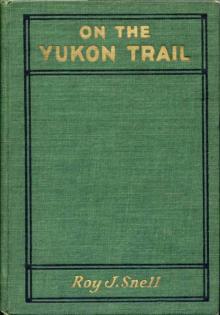 On the Yukon Trail
On the Yukon Trail Wings over England
Wings over England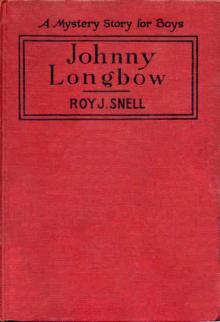 Johnny Longbow
Johnny Longbow Sally Scott of the WAVES
Sally Scott of the WAVES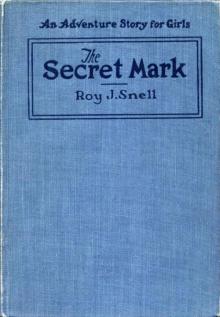 The Secret Mark
The Secret Mark Betty Leicester's Christmas
Betty Leicester's Christmas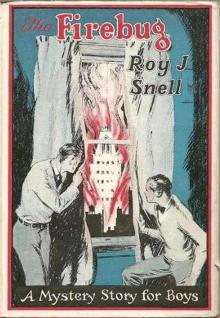 The Firebug
The Firebug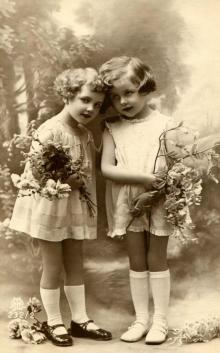 Minnie Brown; or, The Gentle Girl
Minnie Brown; or, The Gentle Girl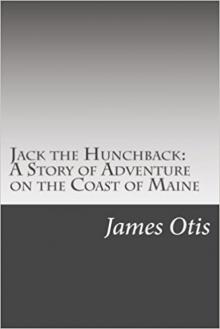 Jack the Hunchback: A Story of Adventure on the Coast of Maine
Jack the Hunchback: A Story of Adventure on the Coast of Maine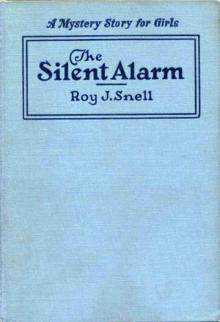 The Silent Alarm
The Silent Alarm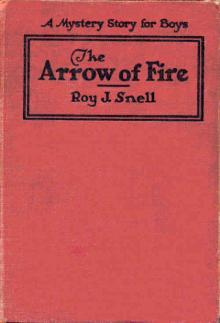 The Arrow of Fire
The Arrow of Fire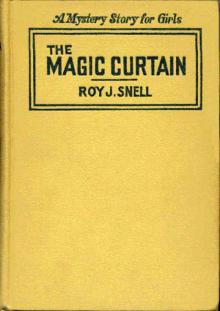 The Magic Curtain
The Magic Curtain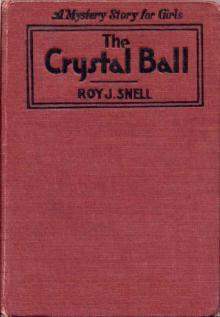 The Crystal Ball
The Crystal Ball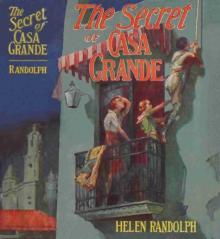 The Secret of Casa Grande
The Secret of Casa Grande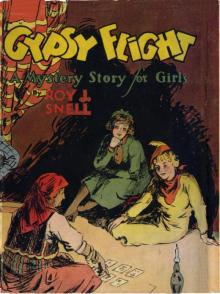 Gypsy Flight
Gypsy Flight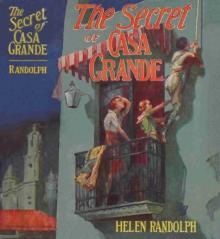 The Mystery of Carlitos
The Mystery of Carlitos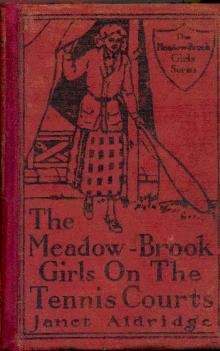 The Meadow-Brook Girls on the Tennis Courts; Or, Winning Out in the Big Tournament
The Meadow-Brook Girls on the Tennis Courts; Or, Winning Out in the Big Tournament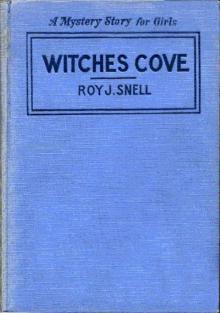 Witches Cove
Witches Cove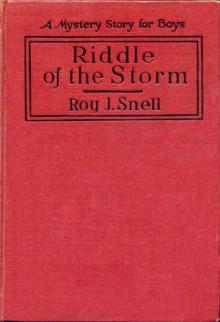 Riddle of the Storm
Riddle of the Storm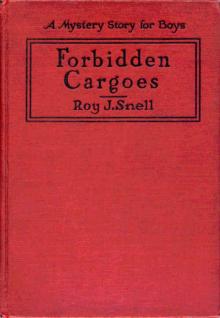 Forbidden Cargoes
Forbidden Cargoes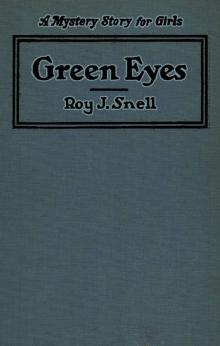 Green Eyes
Green Eyes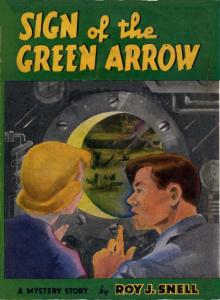 Sign of the Green Arrow
Sign of the Green Arrow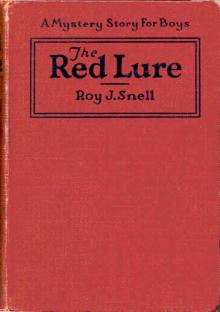 The Red Lure
The Red Lure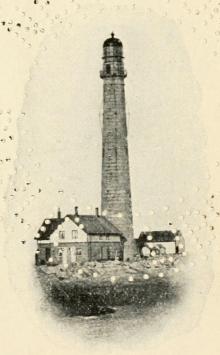 The Light Keepers: A Story of the United States Light-house Service
The Light Keepers: A Story of the United States Light-house Service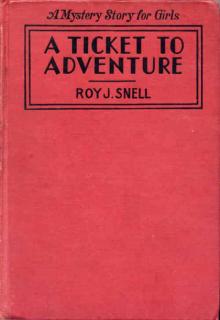 A Ticket to Adventure
A Ticket to Adventure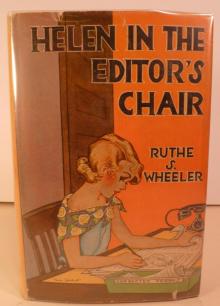 Helen in the Editor's Chair
Helen in the Editor's Chair Blue Envelope
Blue Envelope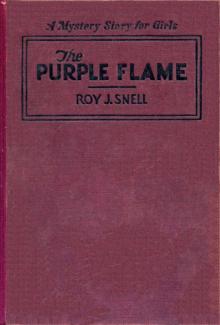 The Purple Flame
The Purple Flame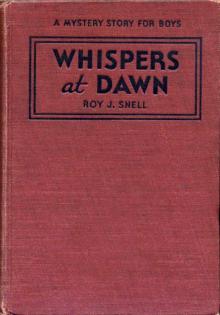 Whispers at Dawn; Or, The Eye
Whispers at Dawn; Or, The Eye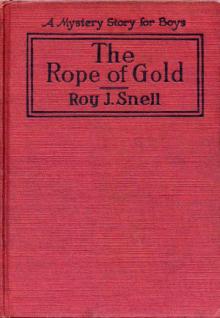 The Rope of Gold
The Rope of Gold Crossed Trails in Mexico
Crossed Trails in Mexico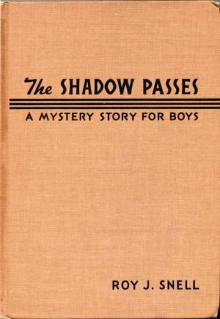 The Shadow Passes
The Shadow Passes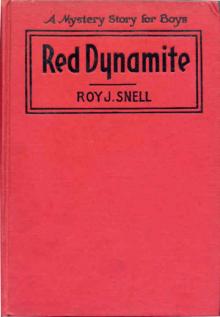 Red Dynamite
Red Dynamite Blue Grass Seminary Girls on the Water
Blue Grass Seminary Girls on the Water The Cruise of the O Moo
The Cruise of the O Moo